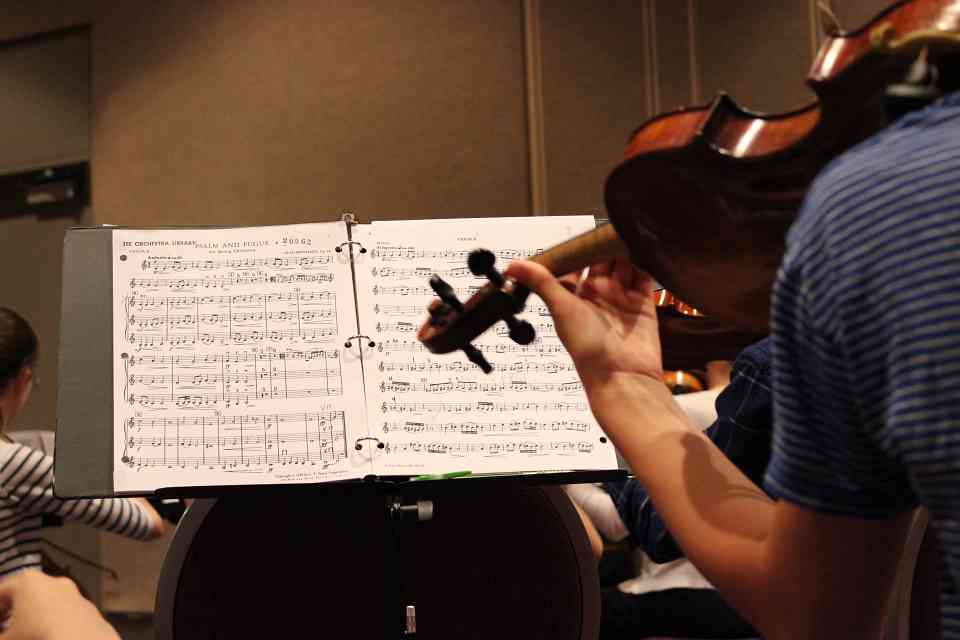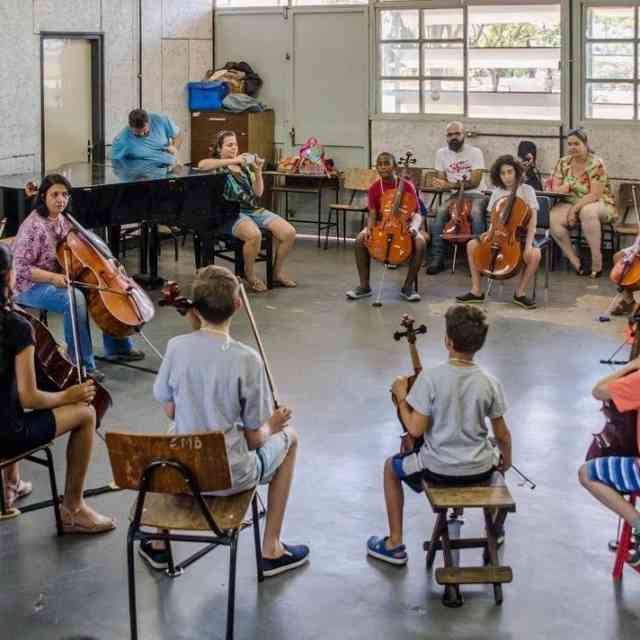
It has happened twice already, this week.
The first time was with my almost-thirteen-year-old daughter, who was working on her new piece and balking at the thought of working out a new passage. “It’s too hard!” she complained. Somehow I managed to get her to play through it slowly, to prove to her that it was, in fact, playable. Then she realized she already had it in her ear. She got excited, and she started working in earnest. Soon she was racing through those few new measures, thrilled at how fun they were to play. I will not pretend it is always this easy—it rarely is—but I love being able to show my children and my violin students that finding and mastering Those Spots You Would Rather Avoid actually makes playing the violin a lot more fun for everyone. This is one of my major goals in teaching.
The second time this happened was when I pulled out a new piece to work on myself. During my initial play-through, I hit some measures with double stops that required awkward—quite awkward—fingerings. I was annoyed. The rest of the piece was pretty straightforward, and I could almost hear the voice of some of my students in my head: Really? Why here? With all my heart I wanted to ignore those measures. There was no getting around the work, though, so after my play-through I went straight to those annoying measures. And as I practiced those awkward shifts over and over, smoothing them out, adjusting the intonation, I started to get lost in the sounds—their quality, their character. The intervals were subtle, mysterious. This awkward, annoying passage was strikingly beautiful.
I admit it. Even though I spend a considerable amount of energy bringing my students straight to the Hard Passages, I still balk at them myself. The work, before it is begun, is still (always!) distasteful. The difference is that I know how and why to confront these passages; it is a discipline I learned well. At first it was imposed on me, simply a part of practicing with my mom when I was young. Of course I fought it—it was work, hard and exacting, and different from anything expected anywhere else in my life. As I got older and more independent in my practicing, I avoided the work more and more. My father, a patient and kind man who was also my violin teacher most of those years, did not say much about the fact that I sight-read etudes in my lesson, or made little progress from week-to-week on my solo repertoire. Instead he bided his time, waiting for a key moment.
His patience paid off. I can still picture the part of the highway we were on, coming in to Minneapolis from the west on Highway 12. Minnesota Public Radio was on, and a violin concerto was playing. It sounded . . . fancy. Brilliant. My dad turned it up.
“Do you like this?” he asked. At the time I was heavily into The Beatles and 80s Top 40, but this music definitely caught my attention.
“Yes!”
“You could play this,” he told me. I was flabbergasted.
“Really?!”
“Of course. But you would have to practice hard, and you would have to do it exactly the way I tell you to.”
And with that promise—that this incredibly adult-sounding, flashy piece was within my range if I approached it correctly—I began to learn how to practice. I did everything my dad said. Worked slowly, note by note. Drilled passages with a metronome over and over. Mastered each phrase before moving on to the next. Tore the difficult passages apart, rebuilt them, and tore them apart again. I know now that this was a continuation of the method used from my very first days as a Suzuki violin student—everything broken down into its simplest form, all the repetition and review and step-by-step work—but it was also a new stage in my development. The student was learning to become her own teacher. I learned to play that concerto well and completely changed my concept of what I could do in the process. Thank you, Viotti. Thank you, Dad.
There is plenty of research out there covering grit and determination and hard work. Hopefully it is a no-brainer by now that private music lessons have much to offer in terms of teaching critical thinking, problem-solving, and the value of hard work. These things are important, and cannot be ignored. But there is something else happening when we practice that is easy to overlook, and also quite profound: the discipline of beauty.
And no, I do not mean the beauty of discipline. That is inherent, of course.
Take that awkward passage, those out-of-tune measures, That Part You Want to Avoid, and turn it into something smooth, ringing, beautiful. This is the bread and butter of musicians’ work. It is what must be done. We train our minds, our ears, our fingers and wrists and arms to turn all the hard stuff into near-perfection.
There is great wisdom in this.
There is life-transforming power in this.
This, maybe, is what Suzuki was getting at in Nurtured by Love (revised edition) when he said “art is the person.” From the very first lesson, we as musicians strive to turn our harsh sounds into ringing tone, our awkwardness into ease. We learn to seek out what is hard and craft it into beauty, even though the beauty was always there on the page and it was really our own ability that was lacking. We learn to listen in order to be changed, to seek out an understanding of each piece of music we encounter and then align ourselves with it technically and expressively so others can hear, as well. We learn to translate and share, and show, but each encounter touches us, first. This is spiritual practice that transcends theology, this art of transformation. If we learn to do it so faithfully in our art, I suspect there is no choice but for it to seep into our lives.
And this is what I want my students to understand, what I want my children to understand, what I want to keep understanding better, myself. I think of all the stories I have heard, and the stories I have told, about practicing: the tears, the violin thrown to the floor, the sheet music violently scribbled over in ballpoint pen. Yes, that hard passage is sometimes that hard. Yes, that thing in your life, or that thing coming directly towards you from the future, it might be that hard. And yet, you have been practicing. You are adept in this discipline of beauty, and you have been practicing at being changed. This skill will serve you. It will follow you through your life. It may be an easy thing to forget, but take heart. Even when you forget, even before you knew, you have been practicing this.








